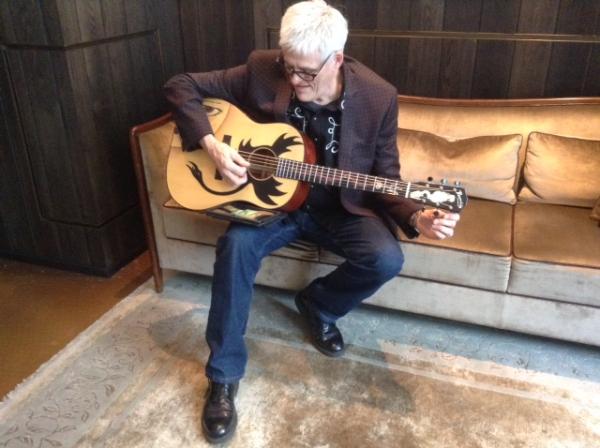Behind the Scene: Scott Baxendale
Welcome to Behind the Scene, a biweekly series where Flagpole and Dirtty Toe Productions profile the people who work offstage to make Athens music matter.

Photo Credit: Pamela Baxendale
WHO HE IS: Scott Baxendale
WHAT HE DOES: Owner/master luthier, Baxendale Guitar
WATCH:
Flagpole: I know that you’re originally from out of town. How did you make it to Athens?
Scott Baxendale: I had a guitar shop in Denver, CO called the Colfax Guitar Shop. It’s located across from the Bluebird Theater, which happens to be one of the prominent venues in town. It’s basically where the bands on the way up and the bands on the way down play. So, I met the Drive-By Truckers and Matt DeFilippis, who is now their tour manager. At the time, he was their guitar tech. They were playing at the Bluebird and they needed some emergency guitar repair, and because we were right there across the street, that was one of our specialties: handling emergencies for people that played there.
I really didn’t know that much about them. I don’t think I made it to that show that night, because maybe I had a gig myself or something. [But] I got their record and fell in love with it and immediately connected to their music in a way that made me think about working with them on a more involved level. I started doing some more work for them and, finally, I built [Mike] Cooley a guitar. Then, I built Patterson [Hood] an acoustic guitar. One thing led to another. They decided they really liked my acoustic guitars. I guess you could say that I helped them sculpt their guitar tone a little bit…
When they did their acoustic tour, they invited me to go out as their guitar tech and they flew me down to Athens for the rehearsals and the very first show at the Georgia Theatre, which was the year before it burned down. [I] fell in love with Athens, and as I got more involved with the people here, I met other bands. I met The Whigs and some other bands and I started doing more work in Colorado [for people] that were actually living in Athens. People were calling me and saying, “I’m going to be at the Bluebird Theater next week. Can you fix a guitar for me?”
I came down [to Athens] and I realized I needed a bridge clamp or something to do an emergency repair and I couldn’t find anyone in town that even had a bridge clamp. And I thought, “Man, maybe there’s nobody around here that does this stuff.” I started thinking, even back then, "If I were going to re-locate my operation, Athens would make a great place for that"… At the same time, I was partnered with my son, and we got to the point where he wanted to go out and start his own shop and be on his own, which, you can’t really blame him—that’s what young men do. So, I realized that if I was going to relocate, this was going to be the time to do it. And I chose Athens.
What are some eccentric requests that you’ve had from clients?
When Hank [Williams] III came [to town], his tour manager came in [and needed] an emergency repair and said, “Whatever you do, I swear, do NOT clean this guitar.” He did not even want us to clean one piece of dirt off of that guitar. Usually the guys want you to clean their guitar. They were adamant: “Whatever you do, do NOT clean this guitar” [laughs].
I’ll give you two [other] funny quick ones. The first one was Phil Alvin of The Blasters. I’ve loved The Blasters since I was a kid. I met Dave Alvin back in the '80s. I never really met Phil, but they were playing at the Bluebird. He came in and he had this iconic Jimmy Reed model Kay electric guitar that was [used] on the opening riffs on “Dark Night,” which is the beginning of From Dusk Til Dawn, the opening scene. And here he walks in with that guitar. The guitar is crumbling apart, it’s delaminating, the neck’s falling off and the strings are like two inches off of the neck, and we said, “What do you want us to do with the guitar?” “You can throw it in the fucking trash for all I care! You can do whatever you want!” So, we glued it all up for him, this amazing super-glue repair job, so that it was ready to go that night. And for the whole entire tour after that, every show from the tour, he would announce our shop as the only place in the world to get your guitar fixed.
If my guitar will inspire Patterson Hood to write a song he wouldn’t have thought of, then, to me, that’s the magic and the total payoff at the end.
Another venue—the Ogden Theatre, which was the next venue up in size—Cheap Trick was playing there, and Rick Nielsen came in. I had worked on some of his stuff years before when I was in Nashville working at Gruhn Guitars. All of my staff were all young guys who didn’t really know much about Cheap Trick and didn’t know who Rick Nielsen was, but I knew exactly who he was the minute he walked in. So, he walks in the shop and he goes, “Whatcha got to show me?” I briefly explained to him that I had met him before at George Gruhn’s in Nashville, and he said, “Oh, yeah. Great.” But, on his way out the door—he’s about 15 feet away from me—he looks over to his side and says, “Keep up the good work, kid!” and he takes one of his signature picks and flips it at me. I’m just standing there and it lands right in the palm of my hand without me trying to grab it or reaching for it. It just went, boom! Right in my hand! Just like out of a movie! Of course, my son and all of his buddies were in the shop, and they didn’t really know the meaning of that moment.
How were you appointed to work on Elvis’ guitar collection?
Well, at the moment, the whole Elvis thing is kind of in limbo. We’re waiting to get word back from Graceland, and basically, they’re responsible for any press releases or anything like that. But, to make a long story short: As part of my luthier school, we do this thing called the Harmony conversion, where we take old Harmony and Kay guitars, take them all apart and rebuild them like pre-war Martins—we rebuild the insides of them. We’ve developed a reputation with musicians with those guitars… Lera Lynn ended up with one of those, and through her travels, she met Buddy Miller in Nashville, who is a big-time producer there. He ordered one from us and then, through him, he connected to Michael Lockwood, who is Lisa Marie Presley’s husband. So, we were doing work for Michael Lockwood and it was basically his thing. And the funny thing is that it came about from the guitars that I do through my luthier school more so than my custom guitars, the high-end custom guitars. So, that’s really cool. It’s great to be considered for that. It’s quite an honor.
You mentioned your luthier school. Do your students come from a wide range of backgrounds and places?
I do have a student here from Connecticut. He’s going through the course and hoping to go back there. But, most of the students have been from around the area. Not necessarily from Athens, but within a 30-mile radius of Athens. Jamie [Thomas], who is now my number-one repair technician, he came down here from Rhode Island. But, I don’t think he moved here specifically to come to my school. He moved down here and just happened to be in proximity of the school.
My first student here was Robert Moats, and he had been through Camp Amped. He was my very first student, and he literally did not know the difference between a screwdriver and a hammer when he walked in the door. I couldn’t have had anyone with less comprehensive knowledge about how to do something with your hands when he walked in. And now, he owns his own shop and he is advertising for work and doing work with people. So, it was really to see him come [through the program]. He was really young, and he wasn’t really getting it at school. He was one of those kids that was too smart for school. He could not connect at school very well. His parents were both really smart, so they tried him out here and said, “We’ll give it a shot.” It basically revolutionized his young-adult life.
Do you feel that preserving these old guitars is preserving an entire culture, in a sense?
When I first started the school, we started… remanufacturing the Harmonies, and I thought, “Wow. This is a really neat teaching tool.” And then, “Well, these guitars are pretty dang good. This isn’t just a teaching tool, we’re making really nice guitars.” Now that I’m looking at it, it’s like, “We’re taking a basically useless guitar that is destined for the dumpster or destined for a wall hanging, and when it was made, it was made with the intention of being a student’s first guitar. And we’re taking this guitar and giving it a whole different life 50 years later.” Fifty years later, we’re turning it into the greenest guitar that you can buy, because we’re not cutting down a bunch of trees to make it.
All these new companies are selling guitars that are made to look old, like they’re fake-reliced. And we’re taking something that is old, real-reliced, and making it new again. The more I do that, the more I think, “Golly. This is really amazing. We’re creating a whole new culture of musicians that have an appreciation for this.” And when I used to lust after vintage guitars, like this [Telecaster] here, that’d be the only guitar that would have my attention. Now, I’m lusting after all these Harmony and Kay guitars that I used to think were junk. The more I learn, the more I realize I didn’t know anything. To me, that’s the really cool thing.
The other thing, which ties into that somewhat, is that I’ve discovered lately that one of my purposes is as a matchmaker for an artist to their instrument. [The recent] weekend with Howe Gelb is a perfect example of that. I just got this guitar and it was a quirky, electric Harmony guitar made for Sears at Silvertone made in the early '50s. I really, really liked the guitar. Normally, all these guitars [on the second floor of Baxendale’s shop] aren’t really advertised for sale; they’re part of my collection, and I use them to play because I really like them. And that guitar was going up here, but it hadn’t quite made it upstairs from being worked on.
[Howe] showed up and tried every guitar in the shop, and I looked at that guitar in the corner and thought, “I bet he’d really like this one.” And it transformed instantly into his instrument. I knew within 30 seconds that this was his guitar. And he took it to the show that night and he announced it on stage, “This is the guitar that I’m thinking about buying. I’m going to play it and as an audience, I want you to tell me if I should get it or not.” A trial run. I loaned it to him to use for the gig—he had an option to buy it or not. There’s no pressure from me for him to buy it… I got there just as he was plugging it in and immediately, the guitar became an extension of his full, entire being. It was instantly this“yes.” The following day, he’s in Knoxville and then he gets home in Arizona. He sends me this picture of his daughter standing out in front of his house holding this guitar, and it’s got this weird metallic-green finish on it. And it’s the exact color of all of the cacti in his front yard!
It’s almost metaphysical, then?
It is. And oftentimes I will see [a guitarist] play and think, “Man, this guy needs to add something to his tone.” And I will start talking to them. To me, that’s part of the excitement and the reward of doing it. As a guitar maker, it’s my mission. I’m an artist that builds a piece of art. And if that piece of art that I make can inspire another artist to make art that they would not have thought of without playing that guitar… if my guitar will inspire Patterson Hood to write a song he wouldn’t have thought of, then, to me, that’s the magic and the total payoff at the end.
Can you enjoy a band without thinking of their guitar tone?
I’m more [apt] to enjoy the moment. But, if I sense a problem or something that I don’t like about their guitar tone… That can turn me off really fast on the music, if the tone of their instrument isn’t hitting me the right way. A lot of modern guitars do that just by nature. A lot of these new instruments are shoved down everyone’s throats through guitar magazines by advertising them as being the newest and greatest and best. It’s not. When you hear somebody that is trying to play something from the soul and it’s plasticined over with this Chinese fabrication that comes out of a computer, sometimes that doesn’t translate very well. When that happens, I know it.
What bands in town are you impressed with?
I love all of the standard stuff—of Montreal, the Drive-By Truckers, the Whigs, Lera Lynn. I love all those people all so much. They’re all putting out new, great stuff. Dead Confederate. All that stuff is really interesting. To be completely honest, I have been so consumed with trying to build guitars and do my own project with Jack Logan that I really kind of missed out on a lot of those bands.
The more I learn, the more I realize I didn’t know anything. To me, that’s the really cool thing.
But, let me scratch all of that and say: The best, most interesting, most exciting music that I see comes directly from Camp Amped. Every time I see a Camp Amped finale, the kids—and I meet them at the beginning, because Pam [Scott’s wife] does all of the pictures—we’re there during the whole two-week period. But, when I see those kids at the beginning and then see what they do two weeks later as an ensemble, it never ceases to blow my mind. That, to me, shows what’s unique about Athens. When I was in Colorado, I was involved with some middle school and high school kids that were doing this little rock and roll camp thing. They all had great enthusiasm and great energy and they could all play really [well]. But, all their music was ahhhh! And you go to see these Camp Amped kids and they’re writing these thoughtful songs with creative arrangements and artistic expression—they’re doing the whole picture. To see that happen over and over again every year shows that there is something different in the water here or that there’s something different in the culture here that allows the kids to do that. There’s such a high concentration of quality here.
What makes a band a success?
I think keeping the party priority in the right perspective is really important, because it’s really easy to let that consume the art. I’ve been victim of that, and so many people are victimized by that. You can do a lot to keep from [getting] into that [situation].
[Also,] I think acting like professionals and having your gear professionally maintained so that when you do perform, that’s the least of your worries… When you show up at the big gig and all of a sudden this cord you’ve been twisting a certain way to make it work for the last month finally fails. The last month you’ve been twisting that cord should have been telling you something.











comments